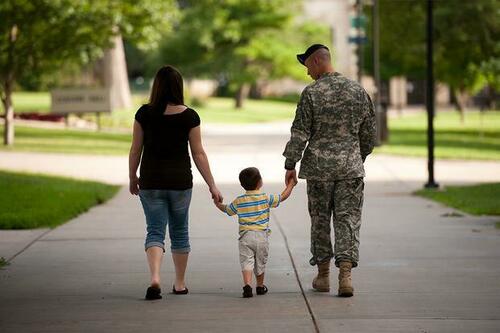Military Families Suffering As Housing Benefits Can’t Keep Up With Exploding Rent
Military families who have long-benefited from housing subsidies are finding themselves unable to afford rent amid record-breaking spikes in rent, as the Department of Defense neglects its commitment to help its service members find affordable places to live.
“It’s affecting us personally but then I think about how we were a junior enlisted family at one point. I cannot imagine the struggles (they) are going through,” said Kristen Marten, whose husband was transferred to Naval Base San Diego.
On-base housing wasn’t an option — the waitlist for a four-bedroom home in the neighborhoods they qualified for was 14 to 16 months.
Neither were the military-only hotels near base where new arrivals can pay low rates as they get their bearings — those were full, too.
So Martin cast a wide net across San Diego and started applying for rental homes, all sight unseen.
“I was waking up and the first thing I was doing was looking at properties,” Martin said. “I was looking at it midday, before I went to bed. I had alerts set. It became a full-time job.” –AP
After sending out more than 30 rental applications – which cost hundreds of dollars in application fees, the Martins finally found a home – for $4,200 per month, nearly $700 more than the monthly basic allowance for housing (BAH) that her husband, a lieutenant, receives.
“We’ll probably be here two or three years, so that could be $20,000 that we’re paying out of pocket above BAH just for rent,” she said, after the family’s fourth move in 15 years.
The situation has forced many military families to settle for substandard homes, long commutes, and paying thousands out of pocket they didn’t plan on spending.
“I don’t think civilians really understand — they might think we’re living in free housing and just having a great time, making lots of money. And that’s not the case at all.,” said Kate Needham, a veteran who co-founded the nonprofit Armed Forces Housing Advocates in May 2021. “We have families coming to us that are on exorbitantly lengthy waiting lists and sitting in homes that they can’t afford, like an Airbnb rental, or they’re at a hotel or camping in tents or living in RVs.”
Needham’s group provides military families with microgrants to help them get by – some of whom have resorted to food banks because they can’t make ends meet.
Several members of Congress have raised the alarm – pushing legislation that would force the DoD to reconsider its BAH budget.
The primary issue, of course, is that the housing allowances are recalculated annually, and haven’t kept pace with rental markets despite the fact that BAHs are intended to cover 95% of rental costs for the roughly 2/3 of active-duty personnel who have to live off base.
According to a data analysis by The Associated Press of five of the most populous military bases in the U.S., housing allowances across all ranks have risen an average of 18.7% since January 2018. In that span, according to real estate company Zillow, rents have skyrocketed 43.9% in those markets: Carlsbad, California; Colorado Springs, Colorado; El Paso, Texas; Killeen, Texas, and Tacoma, Washington.
And because of how tough off-base markets are, on-base housing has become a hot commodity, with many bases having long waitlists.
Needham argues that the discrepancy between military housing allowances and the current market should alarm officials who are already struggling to recruit the next generation. -AP
“If you can’t afford your job, why the hell would you stay in the job?” said Needham. “People are feeling abused by the military in so many different areas — the sexual assault issues, the lack of attention to medical care, the lack of attention to mental health. This is just another tick in the box that’s like, ‘Why would I join the military?’ And if you don’t have enough numbers, that’s a long-term national security problem.“
In Tampa, Florida, housing allowances for those working at MacDill Air Force Base used to be in line with the local market – however a surge in rents which began during the pandemic has led to a crunch. In January 2020, a senior airman who had no dependents was receiving $1,560 per month for housing, vs. the average Tampa rental price of $1,457. Now, rents are $2,118 per month (as of July), while the airman’s allowance is $1,647.
“We are woefully underhoused,” said Tampa property manager and wife of a retired serviceman, Stephanie Poynor. “The DoD needs to recognize how much our soldiers, sailors, airmen, Marines and Coasties are really suffering in this market.”
Tyler Durden
Sun, 08/21/2022 – 14:00

